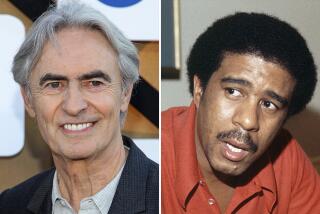THE JERRY AND JESSE SHOW
- Share via
TV is noted for reducing critical issues to personalities. So it was probably inevitable that after the Rev. Jerry Falwell publicly branded South Africa anti-apartheid leader Bishop Desmond Tutu a possible “phony,” and after the Rev. Jesse Jackson publicly rebutted Falwell, the Americans would be invited to battle it out in front of the camera. Somehow, somewhere, sometime there would be a . . .
Jerry and Jesse Show.
Falwell, although saying he is opposed to apartheid, is campaigning to block proposed U.S. economic sanctions against South Africa. Returning from a brief tour of South Africa, Falwell this week lauded the South African government’s “progress” in dismantling its segregationist policies. And he said about Tutu, that nation’s most prominent black clergyman and 1984 winner of the Nobel Prize for his peaceful resistance to apartheid:
“If Bishop Tutu maintains that he speaks for the black people of South Africa, he’s a phony.”
Falwell was blasted by a number of public figures, none as prominent, though--nor as verbally combative--as Jackson. Talking heads on TV are supposed to be a bore, arguing heads a viewer turn-on. So Falwell versus Jackson was a natural.
Falwell’s comments and Jackson’s reaction were given wide media exposure, but, happily, only ABC’s “Good Morning America” went for the full production. Only “Good Morning America” went for the TV debate.
It was Wednesday. And in another of TV’s satellite conference calls, Falwell was in Lynchburg, Va., and Jackson in Boston, while David Hartman was in New York. Two mediagogues and a TV host.
What began as a relatively calm discussion (with the ever-smiling Falwell repeating his line about sanctions making victims of South Africa’s blacks and Jackson unleashing his usual torrent of statistics) soon dissolved into the predictable name-calling contest that “Good Morning America” must have expected. The usually adept Hartman became a passive observer, letting both men run on and on.
The segment jumped and pumped and thumped. It throbbed and bobbed and jabbed and jolted, the perfect ticket for a medium that seeks conflict, whether the arena is prime-time crime busters or news-time media busters.
Jackson, in effect, called Falwell a racist: “Falwell, you supported apartheid in southern America until it was over. Now you’re supporting apartheid in southern Africa while it’s still alive.”
And, as the segment ended, with the “Good Morning America” theme tooting in the background-- Da da da-da-- Falwell got in the last lick. “I love everybody in America,” he proclaimed, still smiling. “I’m sorry Rev. Jackson still thinks all white people are evil,” he added, still smiling. His next sentence was aborted by a bacon commercial.
It was classic Falwell and classic Jackson, the two policlergy at their media best. And, above all, it was good TV. So what if, for the moment, the real issues concerning South Africa seemed overshadowed by the personalities on the screen. The show must go on.
What about those personalities, anyway? Whom do they speak for when they appear on TV?
Jackson’s constituency has been established. He was a candidate for the Democratic presidential nomination with enough backing to be a force throughout much of the campaign. Like Falwell, he is a master of the media, but, unlike Falwell, he is no media quasi-creation.
Falwell apparently has entree to the White House. He is the star of “The Old Time Gospel Hour” and founder of The Moral Majority, a fundamentalist right-wing lobbying group whose name is now engraved in our contemporary lexicon. Yet the size and shape of his constituency is undefined. His influence beyond the White House is unknown and untested. Yet we think of him as being almost bigger than life.
Although his TV reach is far shorter than the lower-key, but equally conservative Pat Robertson of the Christian Broadcasting Network, he has achieved far greater visibility than Robertson through the media.
Falwell understands the media. He knocks the media and uses the media, shrewdly making himself available on every controversial issue. The media love to designate spokespersons and repeatedly return to these old standbys for the swift reaction or predictable quote. It’s the easy way to do business. And because Falwell is facile and articulate and quotable and smiling and controversial and available--and because he claims to represent most Americans--he is a media super star. Have electronic pulpit, will travel.
So when Jerry Falwell returns from South Africa saying that he visited black and mixed-race communities there and that “the entire nonwhite public is saying sanctions will kill our children,” the media listen.
It is certainly true that Bishop Tutu cannot possibly speak for all blacks in South Africa. It would have been helpful, though, if David Hartman had asked Falwell why he believes that a white American preacher can speak for more black South Africans better than Bishop Tutu can.
There is an old “Grin and Bear It” cartoon that applies here. It showed an old blowhard senator being asked by reporters how it was that he knew so much about foreign affairs. “Boys,” he replied, “I didn’t spend two weeks in Europe for nothing.”
So take that , critics of Jerry Falwell. He didn’t spend five days in South Africa for nothing.
More to Read
The complete guide to home viewing
Get Screen Gab for everything about the TV shows and streaming movies everyone’s talking about.
You may occasionally receive promotional content from the Los Angeles Times.






